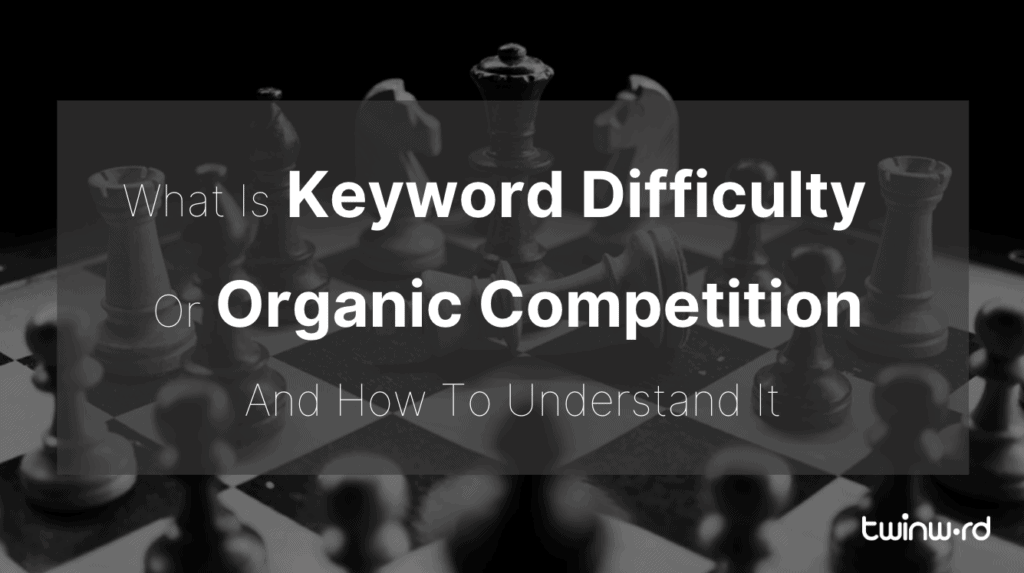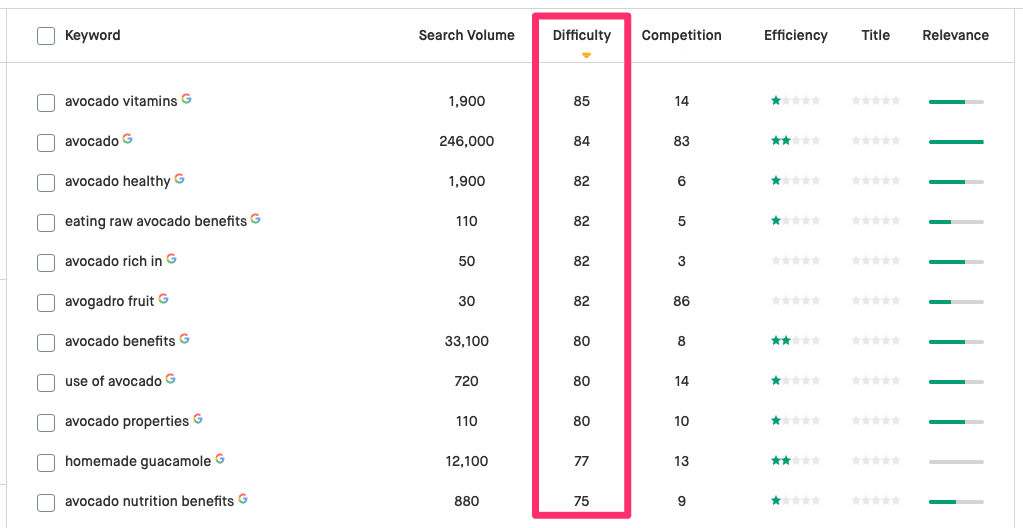
Our keyword research tool Twinword Ideas provides a column for keyword statistics called “SEO Competition”. What is it? SEO Competition or Organic Competition (also called Keyword Difficulty) is a score indicating how hard it would be to have your web site rank high on search engine result pages (SERP) for that particular keyword.
There are lots of factors that decide if your web site will end up on the first page of a search engine results page. For example, some factors include how popular your site is (backlinks), how trusted your domain name is (domain authority), and your content. SEO Competition provides a quick estimate on relatively how difficult it will be for a web site to compete for that keyword.

What does the “organic” in Organic Search or Organic Competition mean?
“Organic” is simply the opposite of “paid” (ie. Organic Search vs. Paid Search). Paid Search (ads) are the results that you see at the top of the search engine result pages. They are usually labeled “Ad”. Companies will pay Google and compete with other advertisers to get their web pages to show up at the top of SERPs for particular keywords.
On the other hand, Organic Search is the results that Google thinks will satisfy the person searching. These web sites do not pay search engines to show up on their SERPs (under the ads); these are what Google thinks deserves to be in the top ten list for particular keywords. They are in the SERP “organically”, so to speak.
Our Twinword Ideas show both an Organic Competition score (named SEO Competition) and a Paid Competition score for Google Ads.
How is the Keyword Difficulty or Organic Competition score calculated?
Most keyword tools will have a Keyword Difficulty score for each keyword and each keyword tool will calculate it differently. When calculating a Keyword Difficulty score, or in our case an SEO Competition score, many factors need to be considered. The following is a list of things that goes into figuring out the score for any particular keyword. This is not an exhaustive list, but points out some of the important ones.
- How many other existing web pages are already targeting and ranking high for that particular keyword?
- For those existing web pages, how many backlinks do they have? A backlink is an instance where some other site has included a hyperlink to their web page or site.
- For those existing web pages, how many backlinks do their web site domain have?
- How trusted are their domains?
- How trusted are their Top-Level Domain (TLD)? Generally, “.edu” and “.gov” are very trusted.
- Is their content good?
- What are their loading times and are they mobile friendly?
- Do they perform well in terms of user engagement?
This list goes on and on.
What is a good Keyword Difficulty or Organic Competition score? Which keyword do I pick?
Generally, the lower the better. Our score has a maximum of 100 and a minimum of 0. However, please note that these are again estimates. A good scientist or a good SEO expert will always test, test, and test! For instance, there are chances that an Organic Competition score is high but it may actually be easier than it seems or vice versa.
All Keyword Difficulty scores or our SEO Competition scores are just a snapshot or estimate of the existing competition. Many factors such as your own web site’s trust and content quality can affect your actual performance. Use these scores as a guideline for further research.
Picking which keyword is an art because no two keyword research campaigns are the same. In fact, every industry, company, product, and even campaign is different. In the end, your goal is to pick the keywords that have relatively more traffic, have relatively less competition, and most importantly relevant to what you are offering.
Keyword Relevance. Get more conversions with the right keywords.
Ranking high is not enough. Ranking high and satisfying users’ search intent is important. This is where Twinword Ideas shines. Twinword Ideas is the first keyword research tool that can sort by relevance and filter by user intent.
For example, if you get a long list of keyword suggestions, you’ll end up with a lot of unrelated keywords or keywords that don’t fit your purpose. However, by using our tool, you can easily sort the list by relevance or use the relevance score filter to hide keywords in the list that have a relevance score less than what you set.
Furthermore, there is also a user intent filter where you can quickly hide the keywords where your offer does not satisfy what the user wanted with their search.
Make sure to check out Twinword Ideas to see how you can remove the fluff and find relevant keywords faster.
Check out other chapters in this series on keyword research:
Chapter 1: Overview Of Keyword Research
Chapter 2: What Is User Intent
Chapter 3: What Are Long-Tail Keywords
Chapter 4: What Is Keyword Difficulty
Chapter 5: Keyword Research Tools




4 Comments
If any Keyword Difficulty is low and competion is high, should i choose that keyword? please suggesst me.
Thanks
Hi Hasan,
Basically, keyword difficulty and organic competition (SEO competition) is the same. It means how difficult it is to rank on Google for that specific keyword organically, considering the current competition. If you find a keyword with a low difficulty score / low SEO competition score, that can be a good opportunity. However, that keyword needs to be relevant to your business or blog.
Of course, you also want to take search volume in consideration. Low search volume keywords can be great as well if they’re very specific keywords that have a high potential to lead to a conversion (leading to a paid customer, or a click on your blog, etc.). But, if there is no significant search volume at all, that means that not many people are searching for that keyword.
I hope this helps!
I found this very useful
I genuinely believe that search engines like Google incorporate numerous various variables into their algorithms.